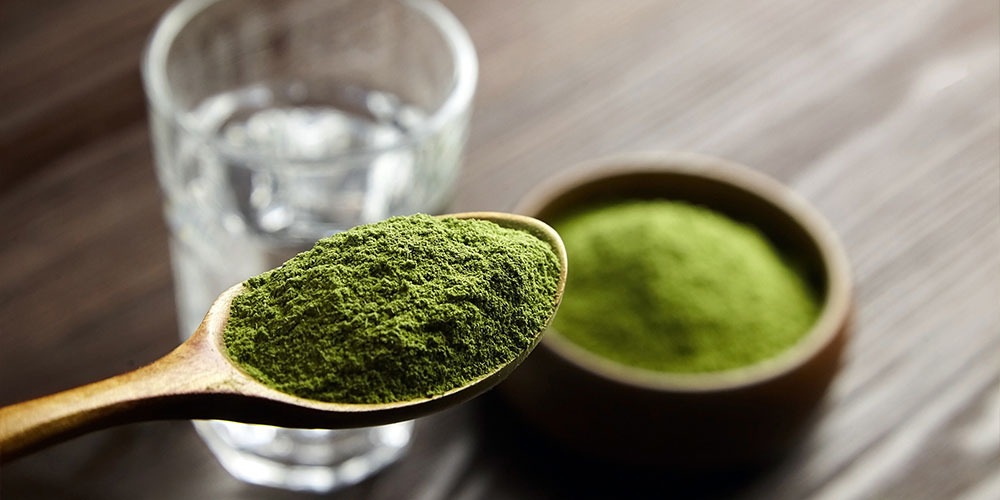By Carol Ann Head, MS, RDN
If busy schedules, food preferences, or lack of knowledge about preparation and cooking techniques leave you feeling like you’re falling short on fruits and veggies, hearing that a scoop of powder can supplement intake may sound like a dream come true, but is it true? Here’s the scoop on their potential benefits and drawbacks, ingredients and claims, and the science behind greens powders.
Greens powders are supplements made from dehydrated fruits and vegetables. They often contain other ingredients, such as digestive enzymes, probiotics, and prebiotics. Claims vary from company to company and often promise increases in immune function, focus, energy, and improved digestion and gut health. The first greens powders hit the market in the 1960s; today, there are dozens to choose from. Many of these blends carry a high price, too, with some topping $75 for a month’s supply.
Can Greens Powders Replace a Serving of Vegetables?
- SERVING SIZE: 7-12 grams on average, or about the size of a tablespoon
- AMOUNT OF FIBER PRESENT IN EACH SCOOP: 1-3 grams
- PERCENT OF RECOMMENDED DAILY FIBER INTAKE IN A SCOOP OF GREENS POWDER: 8% or less for women, 3.5% or less for men
Greens powders contain a variety of vitamins and minerals that may be beneficial to people who are deficient. Eating various fruits and vegetables can produce the same effect while also providing dietary fiber. Fiber is one of the main reasons we need veggies and fruits in our diet. It increases satiety, can help lower cholesterol, and keeps bowels regular. Fiber may also support a healthy gut microbiome!
For the most part, it’s possible to get all the vitamins and minerals we need from a nourishing diet, but those with medical conditions may benefit from specific supplements or complexes that a physician or Registered Dietitian can recommend.
Ingredients in Greens Powders
Greens powders commonly contain 30-40 ingredients, with some numbering in the 70s! Many of the common ingredients are high- FODMAP foods. FODMAPs are short-chain carbohydrates that are poorly absorbed in the small intestine and ferment in the colon, which can cause bloating, gas, diarrhea, cramping, and constipation for some people. Those with sensitive digestive systems, including conditions like FODMAP sensitivity, IBS, or SIBO, may experience these effects.
OTHER INGREDIENTS TO CONSIDER:
- Caffeine, often added to greens powders, increases mental acuity, focus, and sports performance.
- Probiotics, or live bacterial cultures, may have a beneficial impact on gut health. Conditions with evidence for using probiotics include diarrhea, IBS, pouchitis, ulcerative colitis, and Crohn’s disease. Not all probiotic cultures are the same, and some may cause adverse digestive symptoms.
- Digestive enzymes such as bromelain and papain (from pineapple and papaya) are often included. Current evidence does not suggest that eating such enzyme-rich foods improves digestion. A balanced diet will naturally support the enzymes your body already produces.
The Science Behind Greens Powders
There are few studies on greens powders, despite having been around for so long. The gold standard of scientific research, and the only study that can indicate cause and effect, is the randomized control trial. The two studies of this kind on greens powders are summarized below:
• One study showed that Greens+ lowered levels of damaged proteins when two tablespoons were taken daily over four weeks.
• Another study that followed 40 people over 90 days found that two tablespoons of greens powder decreased systolic and diastolic blood pressure by 8%.
The overwhelming bulk of greens powder research is conducted by their parent company. These studies measure self-perceived benefits of the product — that is, participants recorded if they felt better after taking the supplement. These studies lack controls, are open to many forms of bias, and are overall poor indicators of the effect of the product.
If you are considering taking a greens powder, ensure the product has been third-party tested. This means an independent organization has reviewed the product to see if specific safety standards are met and if the product is safe for consumption. Third-party testing is crucial, but keep in mind that it does not validate other claims made about the product. Reputable testing companies include ConsumerLab, U.S. Pharmacopeia, and NSF International, and stamps can be found on the product label.
The Bottom Line
- Greens powders can provide a variety of vitamins and minerals from real fruit and vegetable sources.
- Greens powders can be costly and contain largely the same nutrients found in servings of fresh, frozen, or canned fruits and vegetables.
- Research conducted on greens powders specifically is very limited.
- Consuming whole fruits and vegetables remains the best option for overall health.
Are you looking to make some adjustments to your eating? Reach out to Memphis Nutrition Group to cut through the diet and supplement industry noise and find greater clarity and well-being in your relationship with food.
Carol Ann Head, MS, RDN is a Nutrition Therapist at Memphis Nutrition Group, a nutrition and lifestyle counseling practice offering in-person and virtual nutrition therapy specializing in a non-diet, weight-neutral approach. Contact Memphis Nutrition Group at 901.343.6146 or visit MemphisNutritionGroup.com for more information.







